第二十六届“韩素音青年翻译奖”竞赛(汉译英部分)
- 格式:pdf
- 大小:107.79 KB
- 文档页数:2
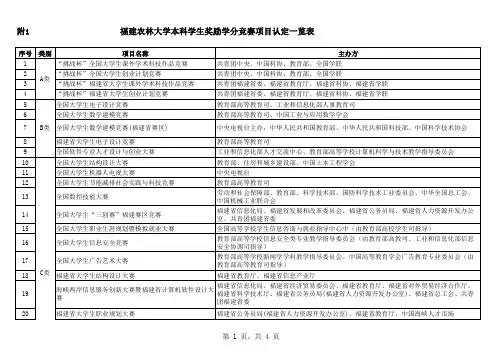
附1 福建农林大学本科学生奖励学分竞赛项目认定一览表
说明:(1)A类:国家部委,或省级政府及其所属的厅局等主管部门举办的“挑战杯”大学生课外学术科技作品竞赛、创业计划大赛。
B类:作为福建省普通高等学校内涵建设主要评价指标学生竞赛。
C类 :国家部委及其所属的司局,或省级政府及其所属的厅局等正厅级以上主管部门举办的未列入福建省普通高等学校内涵建设主要评价指标的学生单项学科竞赛。
D类:国家级学会、团体,或国际知名学会、团体举办的学生单项学科竞赛。
E类:省级学会、协会、团体,或国家级学会的分会组织的单项学科竞赛。
F类:由省级以上政府部门、学会、团体举办的文艺赛事。
(2)竞赛项目所属类别随主办方和内涵评价的变动而进行相应的调整。

译者无疆:一个脑瘫女孩的人生逆袭作者:阿航来源:《恋爱婚姻家庭·青春》2020年第12期在与命运抗争的36年中,尽管脑瘫这个“对手”依然和胡婧形影相随,但是没有什么能阻挡她追求精彩的人生。
折翼——成了重度脑瘫儿1984年11月,胡婧出生于新疆乌鲁木齐市。
出生仅三个月,胡婧就患上了淋巴系统脓肿,高烧不退。
经过医治,高烧总算退了,但却损伤了大脑神经,胡婧成了重度脑瘫儿。
医生直言不讳地说:“孩子长大后,生活不能自理,可能不认识自己的父母,不会说话,没有治愈的希望。
”“无论孩子以后变成什么样,她都是我们的孩子,做父母的怎么会嫌弃自己的孩子呢。
”胡妈妈流着眼泪说。
胡爸爸也倔强地说:“我就不信,我们这么好的孩子以后会不认识父母、不会说话、不会走路?我们会好好照顾她,我不但要让她会说话、会走路,还要让她成为国家的栋梁之材!”胡婧1岁多时,胡爸爸买来录音机和儿歌磁带,天天放给女儿听。
胡婧2岁多时,胡爸爸买来故事画报,下班后就给女儿讲故事。
功夫不负有心人,胡婧3岁的某一天,终于开口说话了:“宝宝好。
”而“宝宝好”三个字正是胡爸爸每天给胡婧讲故事时的开场白。
“女儿会说话了!女儿会说话了!”胡爸爸欣喜若狂,这让他看到了希望。
随后,胡爸爸又买来学习汉语拼音的磁带和书本,让胡妈妈白天一遍一遍地放给女儿听。
他晚上下班回来后,再拿着书本抽考女儿字母发音,并不厌其烦地一遍遍纠正。
就这样,胡婧5岁时,终于学会了汉语拼音,之后又通过拼音读物认识了很多汉字。
从出生到5岁,胡婧一直不能站立,更不能独立行走。
这怎么行?胡爸爸决心帮助女儿站起来。
胡婧从出生后一直由妈妈抱着,甚至连爬都没爬过,双腿的肌肉都已萎缩、僵硬,比正常孩子的腿要细很多。
为了女儿,胡爸爸和胡妈妈进行了分工:白天胡妈妈给胡婧按摩双腿肌肉,做双腿的拉伸屈曲动作。
晚上,再换胡爸爸。
日复一日,年复一年,胡婧的双腿渐渐变得粗壮、灵活、有力量了,可以在床上蹬腿爬了。
接著,胡爸爸开始教女儿练习站立。
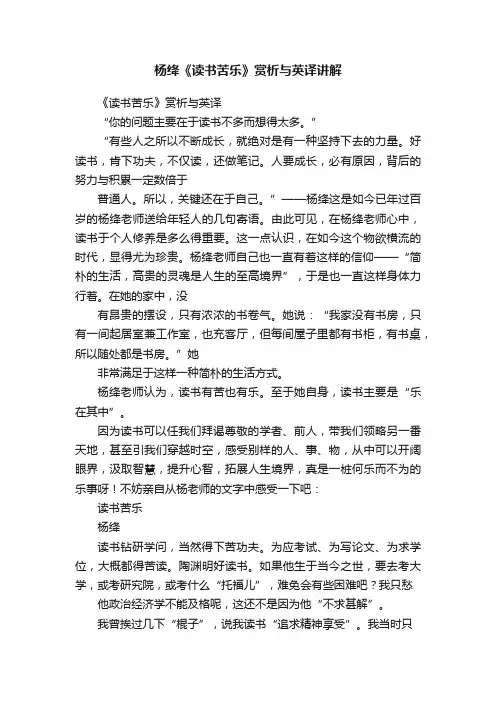
杨绛《读书苦乐》赏析与英译讲解《读书苦乐》赏析与英译“你的问题主要在于读书不多而想得太多。
”“有些人之所以不断成长,就绝对是有一种坚持下去的力量。
好读书,肯下功夫,不仅读,还做笔记。
人要成长,必有原因,背后的努力与积累一定数倍于普通人。
所以,关键还在于自己。
”——杨绛这是如今已年过百岁的杨绛老师送给年轻人的几句寄语。
由此可见,在杨绛老师心中,读书于个人修养是多么得重要。
这一点认识,在如今这个物欲横流的时代,显得尤为珍贵。
杨绛老师自己也一直有着这样的信仰——“简朴的生活,高贵的灵魂是人生的至高境界”,于是也一直这样身体力行着。
在她的家中,没有昂贵的摆设,只有浓浓的书卷气。
她说:“我家没有书房,只有一间起居室兼工作室,也充客厅,但每间屋子里都有书柜,有书桌,所以随处都是书房。
”她非常满足于这样一种简朴的生活方式。
杨绛老师认为,读书有苦也有乐。
至于她自身,读书主要是“乐在其中”。
因为读书可以任我们拜谒尊敬的学者、前人,带我们领略另一番天地,甚至引我们穿越时空,感受别样的人、事、物,从中可以开阔眼界,汲取智慧,提升心智,拓展人生境界,真是一桩何乐而不为的乐事呀!不妨亲自从杨老师的文字中感受一下吧:读书苦乐杨绛读书钻研学问,当然得下苦功夫。
为应考试、为写论文、为求学位,大概都得苦读。
陶渊明好读书。
如果他生于当今之世,要去考大学,或考研究院,或考什么“托福儿”,难免会有些困难吧?我只愁他政治经济学不能及格呢,这还不是因为他“不求甚解”。
我曾挨过几下“棍子”,说我读书“追求精神享受”。
我当时只好低头认罪。
我也承认自己确实不是苦读。
不过,“乐在其中”并不等于追求享受。
这话可为知者言,不足为外人道也。
我觉得读书好比串门儿——“隐身”的串门儿。
要参见钦佩的老师或拜谒有名的学者,不必事前打招呼求见,也不怕搅扰主人。
翻开书面就闯进大门,翻过几页就升堂入室;而且可以经常去,时刻去,如果不得要领,还可以不辞而别,或者另找高明,和他对质。
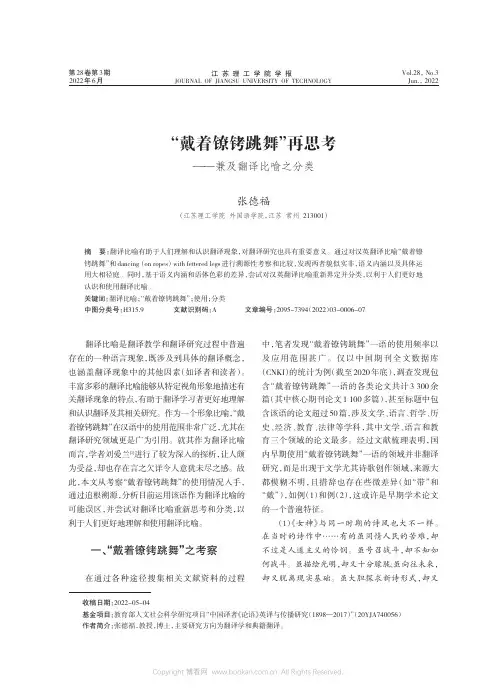
第28卷第3期江苏理工学院学报JOURNAL OF JIANGSU UNIVERSITY OF TECHNOLOGYVo l.28,No.3Jun.,20222022年6月翻译比喻是翻译教学和翻译研究过程中普遍存在的一种语言现象,既涉及到具体的翻译概念,也涵盖翻译现象中的其他因素(如译者和读者)。
丰富多彩的翻译比喻能够从特定视角形象地描述有关翻译现象的特点,有助于翻译学习者更好地理解和认识翻译及其相关研究。
作为一个形象比喻,“戴着镣铐跳舞”在汉语中的使用范围非常广泛,尤其在翻译研究领域更是广为引用。
就其作为翻译比喻而言,学者刘爱兰[1]进行了较为深入的探析,让人颇为受益,却也存在言之欠详令人意犹未尽之感。
故此,本文从考察“戴着镣铐跳舞”的使用情况入手,通过追根溯源,分析目前运用该语作为翻译比喻的可能误区,并尝试对翻译比喻重新思考和分类,以利于人们更好地理解和使用翻译比喻。
一、“戴着镣铐跳舞”之考察在通过各种途径搜集相关文献资料的过程中,笔者发现“戴着镣铐跳舞”一语的使用频率以及应用范围甚广。
仅以中国期刊全文数据库(CNKI )的统计为例(截至2020年底),调查发现包含“戴着镣铐跳舞”一语的各类论文共计3300余篇(其中核心期刊论文1100多篇),甚至标题中包含该语的论文超过50篇,涉及文学、语言、哲学、历史、经济、教育、法律等学科,其中文学、语言和教育三个领域的论文最多。
经过文献梳理表明,国内早期使用“戴着镣铐跳舞”一语的领域并非翻译研究,而是出现于文学尤其诗歌创作领域,来源大都模糊不明,且措辞也存在些微差异(如“带”和“戴”),如例(1)和例(2),这或许是早期学术论文的一个普遍特征。
(1)《女神》与同一时期的诗风也大不一样。
在当时的诗作中……有的虽同情人民的苦难,却不过是人道主义的怜悯。
虽号召战斗,却不知如何战斗。
虽描绘光明,却又十分朦胧;虽向往未来,却又脱离现实基础。
虽大胆探求新诗形式,却又“戴着镣铐跳舞”再思考——兼及翻译比喻之分类收稿日期:2022-05-04基金项目:教育部人文社会科学研究项目“中国译者《论语》英译与传播研究(1898—2017)”(20YJA740056)作者简介:张德福,教授,博士,主要研究方向为翻译学和典籍翻译。
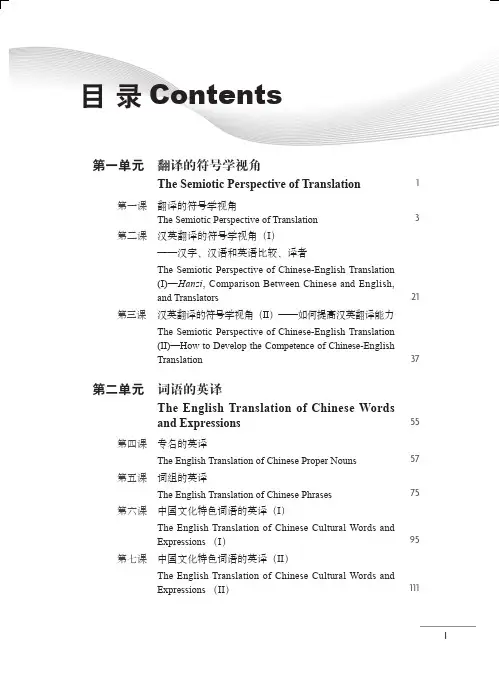
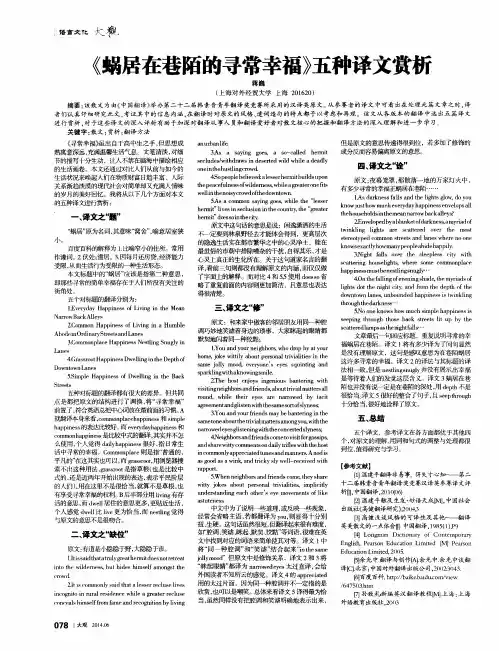
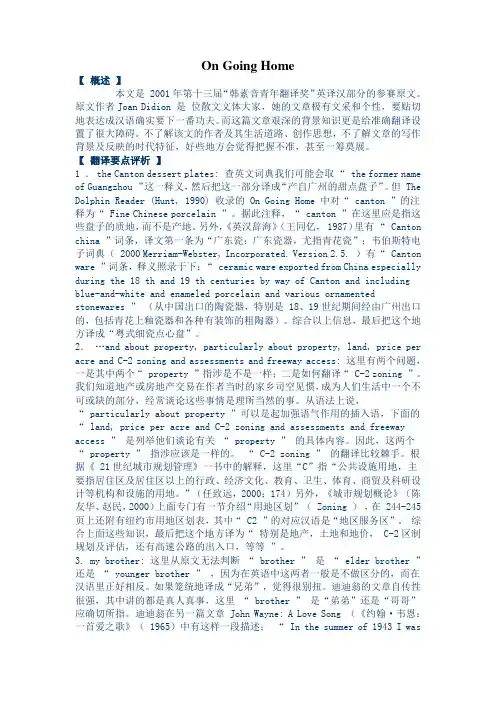
On Going Home【概述】本文是 2001年第十三届“韩素音青年翻译奖”英译汉部分的参赛原文。
原文作者Joan Didion 是位散文文体大家,她的文章极有文采和个性,要贴切地表达成汉语确实要下一番功夫。
而这篇文章艰深的背景知识更是给准确翻译设置了很大障碍。
不了解该文的作者及其生活道路、创作思想,不了解文章的写作背景及反映的时代特征,好些地方会觉得把握不准,甚至一筹莫展。
【翻译要点评析】1 . the Canton dessert plates: 查英文词典我们可能会取“ the former name of Guangzhou ”这一释义,然后把这一部分译成“产自广州的甜点盘子”。
但 The Dolphin Reader (Hunt, 1990) 收录的 On Going Home 中对“ canton ”的注释为“ Fine Chinese porcelain ”。
据此注释,“ canton ”在这里应是指这些盘子的质地,而不是产地。
另外,《英汉辞海》(王同亿, 1987)里有“ Canton china ”词条,译文第一条为“广东瓷;广东瓷器,尤指青花瓷”;韦伯斯特电子词典( 2000 Merriam-Webster, Incorporated. Version 2.5. )有“ Canton ware ”词条,释义照录于下:“ ceramic ware exported from China especially during the 18 th and 19 th centuries by way of Canton and including blue-and-white and enameled porcelain and various ornamented stonewares ”(从中国出口的陶瓷器,特别是 18、19世纪期间经由广州出口的,包括青花上釉瓷器和各种有装饰的粗陶器)。
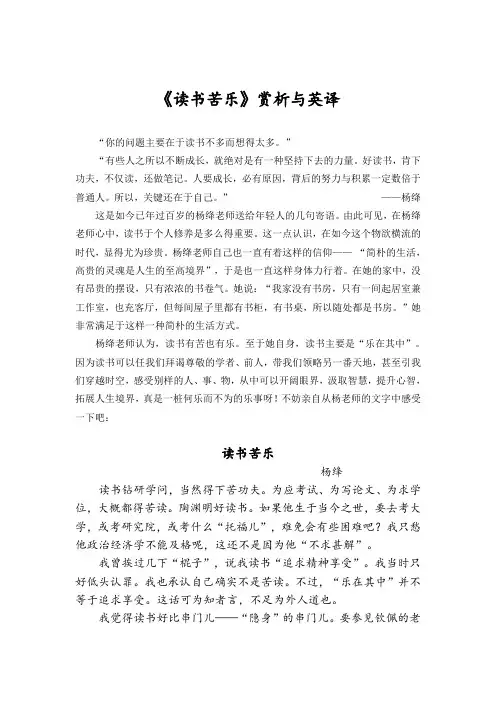
《读书苦乐》赏析与英译“你的问题主要在于读书不多而想得太多。
”“有些人之所以不断成长,就绝对是有一种坚持下去的力量。
好读书,肯下功夫,不仅读,还做笔记。
人要成长,必有原因,背后的努力与积累一定数倍于普通人。
所以,关键还在于自己。
”——杨绛这是如今已年过百岁的杨绛老师送给年轻人的几句寄语。
由此可见,在杨绛老师心中,读书于个人修养是多么得重要。
这一点认识,在如今这个物欲横流的时代,显得尤为珍贵。
杨绛老师自己也一直有着这样的信仰——“简朴的生活,高贵的灵魂是人生的至高境界”,于是也一直这样身体力行着。
在她的家中,没有昂贵的摆设,只有浓浓的书卷气。
她说:“我家没有书房,只有一间起居室兼工作室,也充客厅,但每间屋子里都有书柜,有书桌,所以随处都是书房。
”她非常满足于这样一种简朴的生活方式。
杨绛老师认为,读书有苦也有乐。
至于她自身,读书主要是“乐在其中”。
因为读书可以任我们拜谒尊敬的学者、前人,带我们领略另一番天地,甚至引我们穿越时空,感受别样的人、事、物,从中可以开阔眼界,汲取智慧,提升心智,拓展人生境界,真是一桩何乐而不为的乐事呀!不妨亲自从杨老师的文字中感受一下吧:读书苦乐杨绛读书钻研学问,当然得下苦功夫。
为应考试、为写论文、为求学位,大概都得苦读。
陶渊明好读书。
如果他生于当今之世,要去考大学,或考研究院,或考什么“托福儿”,难免会有些困难吧?我只愁他政治经济学不能及格呢,这还不是因为他“不求甚解”。
我曾挨过几下“棍子”,说我读书“追求精神享受”。
我当时只好低头认罪。
我也承认自己确实不是苦读。
不过,“乐在其中”并不等于追求享受。
这话可为知者言,不足为外人道也。
我觉得读书好比串门儿——“隐身”的串门儿。
要参见钦佩的老师或拜谒有名的学者,不必事前打招呼求见,也不怕搅扰主人。
翻开书面就闯进大门,翻过几页就升堂入室;而且可以经常去,时刻去,如果不得要领,还可以不辞而别,或者另找高明,和他对质。
不问我们要拜见的主人住在国内国外,不问他属于现代古代,不问他什么专业,不问他讲正经大道理或聊天说笑,都可以挨近前去听个足够。
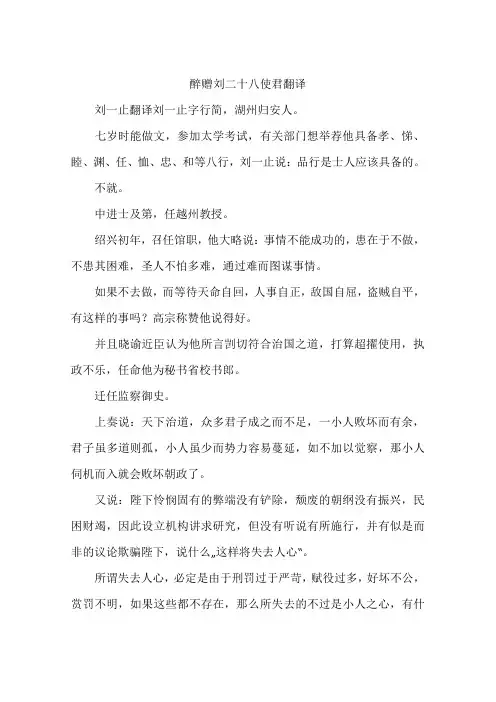
醉赠刘二十八使君翻译刘一止翻译刘一止字行简,湖州归安人。
七岁时能做文,参加太学考试,有关部门想举荐他具备孝、悌、睦、渊、任、恤、忠、和等八行,刘一止说:品行是士人应该具备的。
不就。
中进士及第,任越州教授。
绍兴初年,召任馆职,他大略说:事情不能成功的,患在于不做,不患其困难,圣人不怕多难,通过难而图谋事情。
如果不去做,而等待天命自回,人事自正,敌国自屈,盗贼自平,有这样的事吗?高宗称赞他说得好。
并且晓谕近臣认为他所言剀切符合治国之道,打算超擢使用,执政不乐,任命他为秘书省校书郎。
迁任监察御史。
上奏说:天下治道,众多君子成之而不足,一小人败坏而有余,君子虽多道则孤,小人虽少而势力容易蔓延,如不加以觉察,那小人伺机而入就会败坏朝政了。
又说:陛下怜悯固有的弊端没有铲除,颓废的朝纲没有振兴,民困财竭,因此设立机构讲求研究,但没有听说有所施行,并有似是而非的议论欺骗陛下,说什么…这样将失去人心‟。
所谓失去人心,必定是由于刑罚过于严苛,赋役过多,好坏不公,赏罚不明,如果这些都不存在,那么所失去的不过是小人之心,有什么弊病呢。
当时各种事情正处于草创时期,有关部门以吏所省记作为法度,官吏因此勾结为奸,刘一止说:法令都在,官吏依然营私舞弊,况且一切听凭省记,想任官就引用任例,想夺官就引用夺例,任夺在他的嘴上,弊病能够胜数吗?请将省记之文刊定颁行,这样才能杜绝奸吏玩法受贿的弊端。
朝廷听从了他的意见。
过了一年才写成。
迁任给事中。
对显贵亲近的所有请求,即使是小事也争执不放。
御史中丞廖刚对僚属说:台官应当谏言的,都让刘君先说了。
居此官百余天,上奏不断,当权者开始忌恨他,上奏:刘一止同周葵推荐吕广问,迎合李光。
刘一止被罢免,提举江州太平观。
进为敷文阁待制。
御史中丞何若上奏:刘一止朋附李光,傲慢蔑视皇上。
刘一止被落职,罢祠。
过了八年,请求告老还乡,复职,退休。
秦桧死后,召他到朝廷,刘一止以病不能拜谢,极力推辞,进为直学士,退休。
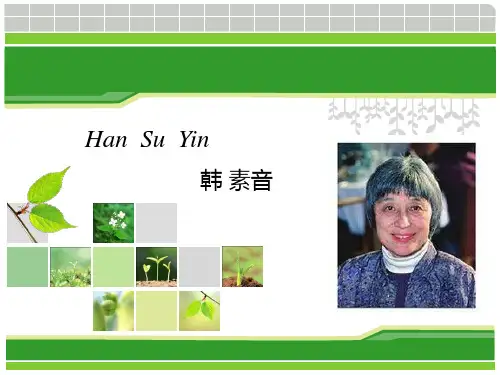
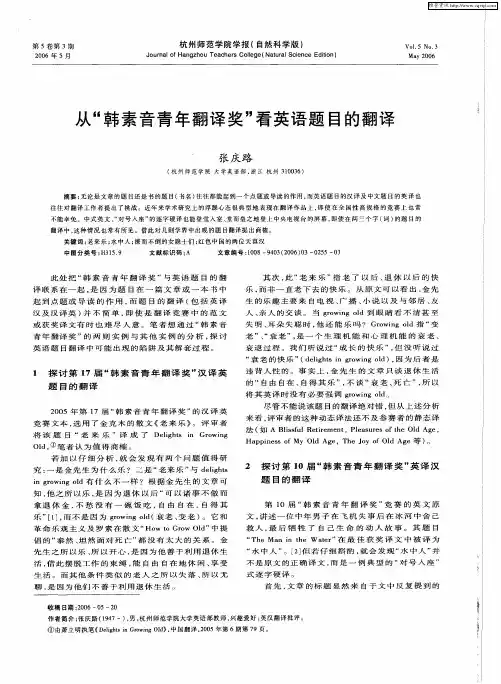
《读书苦乐》赏析与英译“你的问题主要在于读书不多而想得太多。
”“有些人之所以不断成长,就绝对是有一种坚持下去的力量。
好读书,肯下功夫,不仅读,还做笔记。
人要成长,必有原因,背后的努力与积累一定数倍于普通人。
所以,关键还在于自己。
”——杨绛这是如今已年过百岁的杨绛老师送给年轻人的几句寄语。
由此可见,在杨绛老师心中,读书于个人修养是多么得重要。
这一点认识,在如今这个物欲横流的时代,显得尤为珍贵。
杨绛老师自己也一直有着这样的信仰——“简朴的生活,高贵的灵魂是人生的至高境界”,于是也一直这样身体力行着。
在她的家中,没有昂贵的摆设,只有浓浓的书卷气。
她说:“我家没有书房,只有一间起居室兼工作室,也充客厅,但每间屋子里都有书柜,有书桌,所以随处都是书房。
”她非常满足于这样一种简朴的生活方式。
杨绛老师认为,读书有苦也有乐。
至于她自身,读书主要是“乐在其中”。
因为读书可以任我们拜谒尊敬的学者、前人,带我们领略另一番天地,甚至引我们穿越时空,感受别样的人、事、物,从中可以开阔眼界,汲取智慧,提升心智,拓展人生境界,真是一桩何乐而不为的乐事呀!不妨亲自从杨老师的文字中感受一下吧:读书苦乐杨绛读书钻研学问,当然得下苦功夫。
为应考试、为写论文、为求学位,大概都得苦读。
陶渊明好读书。
如果他生于当今之世,要去考大学,或考研究院,或考什么“托福儿”,难免会有些困难吧?我只愁他政治经济学不能及格呢,这还不是因为他“不求甚解”。
我曾挨过几下“棍子”,说我读书“追求精神享受”。
我当时只好低头认罪。
我也承认自己确实不是苦读。
不过,“乐在其中”并不等于追求享受。
这话可为知者言,不足为外人道也。
我觉得读书好比串门儿——“隐身”的串门儿。
要参见钦佩的老师或拜谒有名的学者,不必事前打招呼求见,也不怕搅扰主人。
翻开书面就闯进大门,翻过几页就升堂入室;而且可以经常去,时刻去,如果不得要领,还可以不辞而别,或者另找高明,和他对质。
不问我们要拜见的主人住在国内国外,不问他属于现代古代,不问他什么专业,不问他讲正经大道理或聊天说笑,都可以挨近前去听个足够。
附:第二十四届韩素音青年翻译奖竞赛原文英译汉竞赛原文:It‟s Time to Rethink …Temporary‟We tend to view architecture as permanent, as aspiring to the status of monuments. And that kind of architecture has its place. But so does architecture of a different sort.For most of the first decade of the 2000s, architecture was about the statement building. Whether it was a controversial memorial or an impossibly luxurious condo tower, architecture‟s raison d‟être was to make a lasting impression. Architecture has always been synonymous with permanence, but should it be?In the last few years, the opposite may be true. Architectural billings are at an all-time low. Major commissions are few and far between. The architecture that‟s been making news is fast and fleeting: pop-up shops, food carts, marketplaces, performance spaces. And while many manifestations of the genre have jumped the shark (i.e., a Toys R Us pop-up shop), there is undeniable opportunity in the temporary: it is an apt response to a civilization in flux. And like many prevailing trends — collaborative consumption (a.k.a., “sharing”), community gardens, barter and trade —“temporary” is so retro that it‟s become radical.In November, I had the pleasure of moderating Motopia, a panel at University of Southern California‟s School of Architecture, with Robert Kronenburg, an architect, professor at University of Liverpool and portable/temporary/mobile guru. Author of a shelf full of books on the topic, including “Flexible: Architecture that Responds to Change,” “Portable Architecture: Design and Technology” and “Houses in Motion: The Genesis,” Kronenburg is a man obsessed.Mobility has an innate potency, Kronenburg believes. Movable environments are more dynamic than static ones, so why should architecture be so static? The idea that perhaps all buildings shouldn‟t aspire to permanence represents a huge shift for architecture. Without that burden, architects, designers, builders and developers can take advantage of and implement current technologies faster. Architecture could be reusable, recyclable and sustainable. Recast in this way, it could better solve seemingly unsolvable problems. And still succeed in creating a sense of place.In his presentation, Kronenburg offered examples of how portable, temporary architecture has been used in every aspect of human activity, including health care (from Florence Nightingale‟s redesigned hospitals to the Airstream trailers used as mobile medical clinics during the Kennedy Administration), housing (from yurts to tents to architect Shigeru Ban‟s post-earthquake paper houses), culture and commerce (stage sets and Great Exhibition buildings, centuries-old Bouqinistes along the Seine, mobile food, art and music venues offering everything from the recording of stories to tasty crème brulees.)Kronenburg made a compelling argument that the experimentation inherent in such structures challenges preconceived notions about what buildings can and should be. Thestrategy of te mporality, he explained, “adapts to unpredictable demands, provides more for less, and encourages innovation.” And he stressed that it‟s time for end-users, designers, architects, manufacturers and construction firms to rethink their attitude toward temporary, portable and mobile architecture.This is as true for development and city planning as it is for architecture. City-making may have happened all at once at the desks of master planners like Daniel Burnham or Robert Moses, but that‟s really not the way things happen today. No single master plan can anticipate the evolving and varied needs of an increasingly diverse population or achieve the resiliency, responsiveness and flexibility that shorter-term, experimental endeavors can. Which is not to say long-term planning doesn‟t have its place. The two work well hand in hand. Mike Lydon, founding principal of The Street Plans Collaborative, argues for injecting spontaneity into urban development, and sees these temporary interventions (what he calls “tactical urbanism”) as short-term actions to effect long-term change.Though there‟s been tremendous media attention given to quick and cheap projects like San Francisco‟s Pavement to Parks and New York‟s “gutter cafes,”Lydon sees something bigger than fodder for the style section. “A lot of these things were not just fun and cool,” he says. “It was not just a bottom-up effort. It‟s not D.I.Y. urbanism. It‟s a continuum of ideas, techniques and tactics being employed at all different scales.”“We‟re seeing a lot of these things emerge for three reasons,” Lydon continues. “One, the economy. People have to be more creative about getting things done. Two, the Internet. Even four or five years ago we couldn‟t share tactics and techniques via YouTube or Facebook. Something can happen randomly in Dallas and now we can hear about it right away. This is feeding into this idea of growth, of bi-coastal competition between New York and San Francisco, say, about who does the cooler, better things. And three, demographic shifts. Urban neighborhoods are gentrifyin g, changing. They‟re bringing in people looking to improve neighborhoods themselves. People are smart and engaged and working a 40-hour week. But they have enough spare time to get involved and this seems like a natural step.”Lydon isn‟t advocating an end to planning but encourages more short-term doing, experimenting, testing (which can be a far more satisfying alternative to waiting for projects to pass). While this may not directly change existing codes or zoning regulations, that‟s O.K. because, as Lydon explains, the practices employed “shine a direct light on old ways of thinking, old policies that are in place.”The Dallas group Build a Better Block — which quickly leapt from a tiny grass-roots collective to an active partner in city endeavors —has demonstrated that when you expose weaknesses, change happens. If their temporary interventions violate existing codes, Build a Better Block just paints a sign informing passers-by of that fact. They have altered regulations in this fashion. Sometimes — not always — bureaucracy gets out of the way and allows for real change to happen.Testing things out can also help developers chart the right course for their projects. Says Lydon, “A developer can really learn what‟s working in the neighborhood from amarketplace perspective — it could really inform or change their plans. Hopefully they can ingratiate themselves with the neighborhood and build community. There is real potential if the dev elopers are really looking to do that.”And they are. Brooklyn‟s De Kalb Market, for example, was supposed to be in place for just three years, but became a neighborhood center where there hadn‟t been much of one be fore. “People gravitated towards it,” says Lydon. “People like going there. You run the risk of people lamenting the loss of that. The developer would be smart to integrate things like the community garden — [giving residents an] opportunity to keep growing food on the site. The radio station could get a permanent space. The beer garden could be kept.”San Francisco‟s PROXY project is similar. Retail, restaurants and cultural spaces housed within an artful configuration of shipping containers, designed by Envelope Architecture and Design, were given a five-year temporary home on government-owned vacant lots in the city‟s Hayes Valley neighborhood while developers opted to sit tight during the recession. Affordable housing is promised for the site; the developers will now be able to create it in a neighborhood that has become increasingly vibrant and pedestrian-friendly.On an even larger scale, the major developer Forest City has been testing these ideas of trial and error in the 5M Project in downtown San Francisco. While waiting out the downturn, the folks behind 5M have been beta-testing tenants and uses at their 5th & Mission location, which was (and still is) home to the San Francisco Chronicle and now also to organizations like TechShop, the co-working space HubSoma, the art gallery Intersection for the Arts, the tech company Square and a smattering of food carts to feed those hungry, hardworking tenants. A few years earlier, Forest City would have been more likely to throw up an office tower with some luxury condos on top and call it a day: according to a company vice president, Alexa Arena, the recession allowed Forest City to spend time “re-imagining places for our emerging economy and what kind of environment helps facilitate that.”In “The Interventionist‟s Toolkit,” the critic Mimi Zeiger wrote that the real success for D.I.Y. urbanist interventions won‟t be based on any one project but will “happen when we can evaluate the movement based on outreach, economic impact, community empowerment, entrepreneurship, sustainability and design. We‟re not quite there yet.”She‟s right. And one doesn‟t have to search for examples of temporary projects that not only failed but did so catastrophically (see: Hurricane Katrina trailers, for example). A huge reason for tactical urbanism‟s appeal relates to politics. As one practitioner put it, “We‟re doing these things to combat the slowness of government.”But all of this is more than a response to bureaucracy; at its best it‟s a bold expression of unfettered thinking and creativity … and there‟s certainly not enough of that going around these days. An embrace of the temporary and tactical may not be perfect, but it could be one of the strongest tools in the arsenal of city-building we‟ve got.汉译英竞赛原文:语言与社会身份一个人的语言与其在社会中的身份其实密不可分。
英译汉翻译如是说
章祎
【期刊名称】《新东方英语:中英文版》
【年(卷),期】2006(0)4
【摘要】以已故英籍华裔女作家韩素音女士命名的“韩素音青年翻译奖”是中国翻译界组织时间最长、规模最大、影响最广、规格最高的翻译大赛。
本文就是2005年“韩素音青年翻译奖”获得者章的翻译经验谈,希望对大家有所帮助。
【总页数】4页(P34-37)
【关键词】英译汉;中国翻译;准确理解;原文;英语;词组;中文;译者;译文;地道
【作者】章祎
【作者单位】华中理工大学英语专业
【正文语种】中文
【中图分类】H319
【相关文献】
1.浅析简体与繁体英译汉四字格翻译--以The Kite Runner英译汉2种版本为例[J], 张丽丽
2.在线翻译网站英译汉比较分析r——百度翻译与有道翻译 [J], 黄雅琼
3.语义翻译与交际翻译视角下报纸新闻标题英译汉翻译研究 [J], 曾杰海
4.释意理论视角下定语从句的英译汉翻译策略分析r——以2017年马克扎克伯格的哈佛大学毕业演讲稿英译汉分析为例 [J], 陈裕辉;饶晓
5.浅析简体与繁体英译汉四字格翻译——以The Kite Runner英译汉2种版本为例 [J], 张丽丽
因版权原因,仅展示原文概要,查看原文内容请购买。
UNIT 1 一. 汉译英概述 1.汉译英的重要性
经济全球化的日益发展,使文化全球化成为可能。如今,任何国家都不可能在一个封闭的环境下独善其身(stay alone and pay no attention to others),任何民族的文化发展,都离不开与其他文化的交流、借鉴(borrow ideas, draw lessons from each other)和融合(integration)。不同文化之间的交流,是人类发展的动力。
随着中国参与国际化进程日渐深入,中国人和中国商品走向世界,以及西方世界对于中国文化的浓厚兴趣,社会对于翻译实践提出了新的要求,即需要大量‚汉译英‛翻译人才将中文文本译成外文,尤其是英文。由于中国语言文字的特殊性,也由于历史和现实的原因,精通中文的外国人太少,所以要将中文优秀作品介绍到国外,必须由中国人自己来进行翻译工作。
2.汉译英人才短缺 中国缺乏‚汉译英‛人才。
中国目前每年汉译英的出版物仅1000多种,而每年进入中国的英译汉出版物却超过万种,是汉译英作品的14倍。(出版贸易逆差) 如果是把英文译成中文,每千字稿费需要50元至60元,而把中文译成英文或其他文字,稿费就达每千字300元。即便这样,也很难找到了解中国文化,又具有高超外语写作能力的人。能担此重任的,通常是汉学家(sinologist / Sinology: the knowledge or study of China, its language and culture)和在国外生活多年的中国学者。(赵月瑟 / deputy editor-in-chief, Shanghai Translation Publishing House)
‚中国真正合格‘中译英’人才不足百人,缺少‘中译英’,将导致文化上的‘逆差’。‛(黄友义 / Vice Chairman, International Federation of Translators)
英汉互译的三种基本方法上海理工大学教授,第十四、第十五届韩素音青年翻译奖竞赛汉译英三等奖、英译汉二等奖获得者张顺生1999年笔者到高校工作以后,参加了第十四届和第十五届韩素音青年翻译竞赛。
参加第十四届竞赛纯属偶然,竞赛截止的几天前我刚好浏览了《中国翻译》杂志,不经意间读到了上面刊登的竞赛活动,其中汉译英“想起清华种种”不长,自己特感兴趣,因此连忙回家认真翻译了初稿,后来又校对了几遍,便投了出去。
没想到竞幸运地获得了三等奖。
第十五届韩素音青年翻译竞赛汉译英我虽未获奖,英译汉却幸运地获得了二等奖。
我对第十五届韩素音青年翻译竞赛的印象非常深刻,比如汉译英的题目“常想一二,不思八九”的翻译,我当时的翻译为“Always Bear in Mind the Few Happy Things,Never Take to Heart the Many Unhappy Ones”,而对英译汉的题目“A Person Who Apologises Has the Moral Ball in His Court”(参考译文译作“谁给别人道歉,谁就在道义上掌握了主动”)的翻译,当时也颇费周折,我觉得汉译宜简洁些,故经再三考虑,将其译作“主动道歉理不亏”。
两次参赛荣幸获奖提振了我对英汉互译的信心,也点燃了我对翻译的兴趣。
近年来我不仅一直鼓励学生参加韩素音青年翻译奖竞赛,还举办了两次校级翻译竞赛,出了2014年姑苏区翻译竞赛试题。
从事翻译和翻译教学工作过程中,自己也有一些心得体会,籍此机会跟大家分享一下。
以往的翻译方法多是从“直译和意译”和“归化和异化”等角度而谈的,我这里则想从译语与源语的关系来探讨英汉互译方法。
我认为英汉互译基本方法有三种,即直接套用、结构模仿和融会创新。
一、直接套用所谓“直接套用”指翻译时如能采用“拿来主义”的即采用“拿来主义”,不必另起炉灶,尤其是单词、词组和句子层面。
比如,翻译“石头剪子布”就可以直接将英语中对应的词找出,直接套用英语中的rock- paper-scissors;“口水战”可套用英语中的a war of words;游戏“打水漂”可套用英语中的词组play ducks and drakes;“傻人有傻福”可套译为Fortune favors fools;“谋事在人,成事在天”可套译为Man proposes, God disposes;从交际角度而言“人非圣贤,孰能无过”可视具体情况套用蒲柏(Alexander Pope,1688-1744) 的To err is human或Even Homer sometimes nods;翻译“喊破嗓子,不如甩开膀子”时孙宁巧妙地套用了英语中的“Talking the talk is not as good as walking the walk”。
UNIT 1一. 汉译英概述1.汉译英的重要性经济全球化的日益发展,使文化全球化成为可能。
如今,任何国家都不可能在一个封闭的环境下独善其身(stay alone and pay no attention to others),任何民族的文化发展,都离不开与其他文化的交流、借鉴(borrow ideas, draw lessons from each other)和融合(integration)。
不同文化之间的交流,是人类发展的动力。
随着中国参与国际化进程日渐深入,中国人和中国商品走向世界,以及西方世界对于中国文化的浓厚兴趣,社会对于翻译实践提出了新的要求,即需要大量“汉译英”翻译人才将中文文本译成外文,尤其是英文。
由于中国语言文字的特殊性,也由于历史和现实的原因,精通中文的外国人太少,所以要将中文优秀作品介绍到国外,必须由中国人自己来进行翻译工作。
2.汉译英人才短缺中国缺乏“汉译英”人才。
中国目前每年汉译英的出版物仅1000多种,而每年进入中国的英译汉出版物却超过万种,是汉译英作品的14倍。
(出版贸易逆差)如果是把英文译成中文,每千字稿费需要50元至60元,而把中文译成英文或其他文字,稿费就达每千字300元。
即便这样,也很难找到了解中国文化,又具有高超外语写作能力的人。
能担此重任的,通常是汉学家(sinologist / Sinology: the knowledge or study of China, its language and culture)和在国外生活多年的中国学者。
(赵月瑟 / deputy editor-in-chief, Shanghai Translation Publishing House)“中国真正合格‘中译英’人才不足百人,缺少‘中译英’,将导致文化上的‘逆差’。
”(黄友义 / Vice Chairman, International Federation of Translators)3.汉译英是一个难点一年一度的“韩素音青年翻译奖”是英籍著名华裔作家韩素音女士,于1989年3月专门为中国青年人设立的,是目前我国最高的翻译竞赛奖。
1
城市的迷失
The Disorientated City / The City in Disorientation
沿着瑗珲—腾冲线,这条1935年由胡焕庸先生发现并命名的中国人口、自然
和历史地理的分界线,我们看到,从远距离贸易发展开始的那天起,利益和权力
的渗透与分散,已经从根本结构上改变了城市的状态:城市在膨胀,人在疏离。
里尔的阿兰(Alain)的话到今天仍然振聋发聩:“金钱万能,不是凯撒万能。”
Along Aihui-Tengchong Line, the demarcation line discovered by Hu Huanyong in
1935 for the population and natural and historical geography of China, we can see that
since the very day when long-distance trade emerged, the infiltration and dispersion
of interests and powers has fundamentally changed the profiles of cities: cities are
expanding, but people are getting estranged. Alain de Lille’s words “Now not Caesar
but cash is everything” remain thought provoking even today.
在古罗马,柱子是按照人的比例划分的;到了文艺复兴时期,人就是世界上最
美好的尺度。今天的中国城市里,裁弯取直的河渠,向四面八方扩张的交通,膨
胀硕大的以便于接纳更多商业行为的城市广场与建筑立面,都在告诉人们建设背
后的权力与资本才是审美标准。直到有一天,回过头来看到自己的孩子站在为车
辆交通铺开的、满是尘土的路上,我们才发现,城市的大,却容不下一个让孩子
们展开笑颜的机会。
In ancient Rome, columns were categorized according to the proportion of the
human being. By Renaissance, human being had become the best scale in the world.
In the cities in current China, the straightened river courses, the transportation lines
radiating in all directions, and the swollen and sprawling city squares and building
facades to accommodate ever more commercial activities all bespeak the fact the
powers and capital underlying the construction spree are the very esthetic standards.
One of those days, when we turn back, we will see our own children standing on the
roads strewn with traffic and grime. Only then will we discover that big as the city is,
it can not harbor a chance for smile to unfold on their faces.
规划和设计的弊病,不在于追求利益这件事情本身,而在于追求利益和权利时
的鬼迷心窍,把人类其他的需要都忘记得一干二净。城市数量在变多、规模在扩
大、城乡结构在解体,但城市的性质和目的,却被忘却了:最聪明的人不再懂得
社会生活的形式,而最无知的人却准备去建设社会生活的形式。
The drawbacks with city planning and designing does not lie in the pursuit of profit
per se, but the infatuation with interests and rights, which cleanly brushed aside the
2
other needs of mankind. Cities are growing in number and scale, and urban-rural
structure is falling apart. However, the nature and objectives of cities are forgotten:
the wisest can no longer make anything of the various forms of social life, while the
most ignorant are setting about constructing new forms of social life.
城市大了,人小了。人们和他们的城市息息相关而又格格不入。人们不能获得
有悖于商业世界、内容更充实更满意的生活手段,成为了旁观者、读者、听众和
消极的观察者。于是,我们年复一年不是真正地生活着,而是间接地生活着,远
离内在的本性。这些本性,掠过照片沉默和迷茫的脸孔,偶然从天空飘过的风筝
看到,偶然从孩子们看到鸽子时脸上的笑靥看到。
Cities sprawled and the human beings are further dwarfed. People are intimately
connected to their cities, but are totally incompatible with them. Denied access to
means of life that are against the commercial world but that are more enriching and
more satisfactory, they have become lookers-on, readers, listeners and passive
observers. As a result, we are not living in the true sense of the word, year in and year
out. Instead, we are living an indirect life, far from our innermost self, which, flitting
from the silent and baffle faces, can be occasionally found in the kites drifting across
the sky and the smiling faces of children spotting a pigeon.
人与城市的分离,让人无所适从;让人欣慰的是,大家都没有忘记要生活这件
事。城市最早作为神祗的家园,代表了永恒的价值、安慰和神的力量。过去人与
人的隔离与区别,将不能维持下去;城市最终体现的不再是一个神化了的统治者
的意志,而是城市每一个个体和全体的意志;它不再是冲突本身,而成为了为日
常生活的矛盾与冲突、挑战与拥抱提供生动舞台的容器;艺术与思想有一天也能
闪现在城市的角落,与人们的生活相交织。也许到了这一天,我们才能真正说,
城市让生活更美好。
Estrangement of mankind and cities renders man totally disoriented. To our relief,
no one has ever forgotten about living. As the homestead of deities at the outset, cities
stand for eternal values, consolation and immortal powers. The isolation and
discrimination between people will not be sustained. Ultimately, cities no longer
embody the will of deified rulers, but that of each and every individual city dwellers,
as well as that of city dwellers as a whole. It is no longer conflicts per se, but a
container furnishing a stage for everyday contradictions and conflicts, challenges and
embraces. In time, art and thought will be sparkling in the corners of cities, and be
intertwined with the life of people. Maybe only by then can we say that city betters
life.